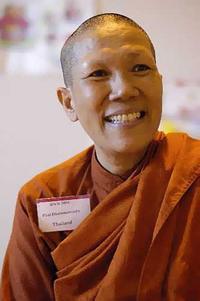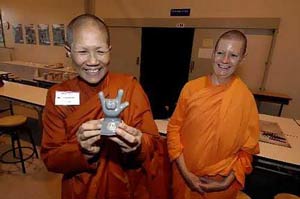A female monk takes on Thailand's clergy
The Advertiser, November 17, 2004
While the general public is more open to female ordination, the Thai clergy remains fiercely opposed. A lone female monk has riled the religious hierarchy by waging a fight for ordination of women, reports Connie Levett from Nakhon Prathom, Thailand.
 This morning Dhammananda Bhikkhuni rose at 4 o'clock to shape the clay medicine Buddha she is creating and seek strength for the day ahead.
This morning Dhammananda Bhikkhuni rose at 4 o'clock to shape the clay medicine Buddha she is creating and seek strength for the day ahead.
In a country of 63 million people, where 92 per cent are Buddhist, it may seem strange that this devout woman should feel alone. But she is an island, swathed in saffron and buffeted by controversy, the only ordained Thai female monk in the conservative Therevada Buddhist tradition, the main such tradition in Thailand.
"I am very much a feminist for Buddhism, and I draw my strength as a feminist from Buddha's teaching," the 59-year-old mother of three says. She wants to re-establish the line of bhikkhuni (female monks) that died out in Thailand more than 1000 years ago.
In the city of Nakhon Prathom, 56 kilometres west of Bangkok, her simple two-storey wooden temple is overshadowed by the glorious golden pagoda of Wat Pra Pathom Chedi, reportedly the largest Buddhist monument in the world. Only a small sign in Thai and English - "Welcome, international bhikkhuni sangha in residence" - tips the passer-by that here is a rare and revolutionary place.
The Buddha set up the bhikkhuni order more than 2500 years ago to give women equal access to spiritual practices, Dhammananda says. He warned that the strength and wellbeing of the movement relied on four pillars: bhikkhu (male monks), bhikkhuni (female monks), upasaka (male laypeople) and upasika (female laypeople).
The line died out naturally in Thailand but there is nothing natural about the Buddhist establishment's attempts to ensure it is not resurrected. In 1928, Thailand's supreme patriarch, responding to the attempted ordination of two women, issued an edict that monks must not ordain women. The two women were reportedly arrested and jailed briefly.
Today, while the public is more open to the concept, the Thai sangha, or clergy, remains fiercely opposed.
"Women's ordination is impossible," Phra Dheppdilok, an assistant abbot and a spokesman for the clergy's conservative camp told the Matichon newspaper after Dhammananda's low ordination in Sri Lanka in 2001. (She was fully ordained in 2003).
"Why pressure monks?" the spokesman said. "All she wants is to create confusion in the country and to find ways to berate monks."
In opposing women's ordination, Buddhist clergy argue that scriptures say bhikkhu and bhikkhuni must be present for ordination of a woman; this is not the case for a man, and as the female line has died out, it is impossible.
The male-dominated hierarchy, backed by wealth and tradition, has attacked Dhammananda publicly and instructed its monks not to deal with her.
Unfortunately for the Buddhist Council of Elders, its opponent has a fierce intellect and is not afraid to challenge their views on holy texts. Previously known as Dr Chatsumarn Kabilsingh, she was a professor of Buddhist philosophy at the Thammasat University in Bangkok for 20 years, has written 40 books on Buddhism and hosted a popular television talk show Cheewit-mai-sin-wang (Life is not Without Hope) for seven years before taking her vows.
Dhammananda Bhikkhuni was an academic, author and talk show host before becoming a monk. Photo by Kees Metselaar
 She says it was difficult to give up wealth and her career but she felt the time was right.
She says it was difficult to give up wealth and her career but she felt the time was right.
She and her husband, married for more than 30 years, had grown apart and are now divorced.
When reformist monks in Sri Lanka restored the bhikkhuni tradition a decade ago, they argued that the Therevada line of female monks had not been broken, because it continued in the Mahayana tradition in East Asian countries. The logic was that the East Asian tradition was established when Sri Lankan female monks travelled to China in the 5th century.
Now Dhammananda wants to bring that tradition back to Thailand. It will not be easy. Recently, Senator Rabiabrat Pongpanich, a women's rights activist, received a death threat after suggesting there should be equal access for women to holy sanctuaries at several temples.
However, the revolution goes on for Dhammananda. She has presided over low ordinations in Thailand but the women must go to Sri Lanka for full ordination because the presiding monk must have at least 12 years' experience.
Dhammananda plans to ordain her first female monk on Thai soil when she reaches that milestone. Having disowned her, Buddhist authorities have tied their own hands. "The supreme patriarch can't do anything because he did not accept me in the beginning, so I am not under his authority now," she says.

 This morning Dhammananda Bhikkhuni rose at 4 o'clock to shape the clay medicine Buddha she is creating and seek strength for the day ahead.
This morning Dhammananda Bhikkhuni rose at 4 o'clock to shape the clay medicine Buddha she is creating and seek strength for the day ahead. She says it was difficult to give up wealth and her career but she felt the time was right.
She says it was difficult to give up wealth and her career but she felt the time was right.